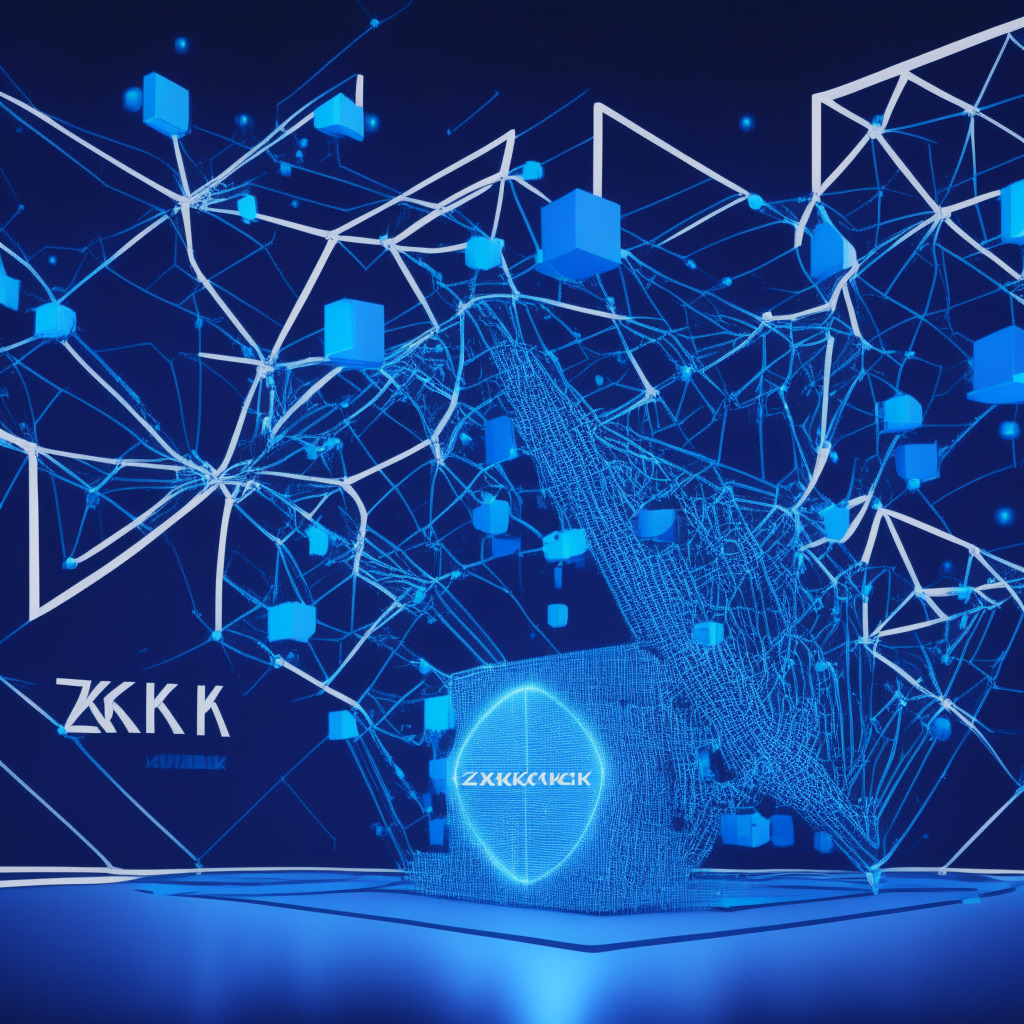Fortress Trust disclosed theft of its customer’s digital assets amounting to nearly $15 million, blaming third-party player Retool. As customers from the crypto business suffered, Retool claimed that those who had prioritized security were unaffected. This incident underlines inherent risks in the cryptocurrency market, showcasing the increasing need for flaw-proof preventative measures.
Search Results for: RSI
Unraveling the Impact of Eased AI Regulations: Case of Alibaba’s Tongyi Qianwen & Blockchain Future
“Alibaba announced the launch of its AI system, Tongyi Qianwen, amidst China’s eased AI regulations. The Chinese government now requires all AI technologies to undergo a vetting and certification process. This leads to queries about the effect on the blockchain and cryptocurrency landscape, and potential lessons the US could learn from this context.”
Failing or Succeeding? Evaluating The Blockchain Association’s Influence on Crypto Legislation
The Blockchain Association, a leading crypto trade association, continues to face skepticism and regulatory hurdles despite its five-year existence. With progress impeded by the fall of FTX and reduced support from congress members, the association’s efforts to pass comprehensive crypto legislation remain unsuccessful. Notwithstanding these setbacks, it has managed some victories in mitigating impacts of proposed regulations and supporting member companies. However, the future still presents significant obstacles, and crypto lobbyists are urged to remain humble about their “achievements.”
Navigating the Regulatory Tussle: Decentralization vs Security in the Digital Asset Realm
The rapid transformation in technology and finance is due to the expanding incorporation of blockchain technology and digital assets. While this revolution brings significant advantages, it also comes with regulatory complexities. For instance, the recent verdict of the Delaware bankruptcy court granting FTX the right to sell their digital assets highlights control issues contrary to blockchain’s decentralized nature.
Paxos’s $500k Bitcoin Transfer Misstep: Critical Lessons for the Crypto World
Paxos, the company behind major stablecoins, has owned up to a significant Bitcoin transaction error, costing $500,000 in fees to move approximately $2,000 worth of Bitcoin. This seems to be a result of a bug causing overcompensation of the network fee. However, Paxos reassures users that their funds remain secure and unaffected. This incident emphasizes the need for continual refinement in payment systems to avoid such costly errors in the future.
Navigating the Bitcoin Market Amidst Soaring Inflation – Worth the Risk?
“This article underscores Bitcoin’s role as a potential hedge against inflation, particularly during recent CPI growth. The piece analyzes the cryptocurrency’s current price trends and technical indicators, advocating for informed decision-making given the volatile nature of digital assets.”
Ripple’s Acquisition of Fortress Trust: A Response to Security Breach or Strategic Move?
“Ripple’s acquisition of the Fortress Trust was influenced by a security breach involving a third-party analytics vendor. The breach resulted in a loss of approximately $12-$15 million, primarily in Bitcoin. This incident underscores the critical importance of security and transparency in crypto-asset management and showcases businesses’ willingness to act decisively to protect customers.”
Navigating Uncertain Market Waters: Analyzing BCH’s Struggle for $200 and $WSM’s Promising Debut
The article discusses BCH’s struggle to cross the symbolic value of $200, indicating the lack of strength to move beyond key resistance levels. Coupled with the possibility of BCH falling back to $160, this could also create an opportunity for buyers if the market resumes the bull run. Conversely, if BCH fails to gain support at $160, a drop into the early $100s might occur. The newly to be launched $WSM token is also highlighted for its potential.
Opera Mini Harnesses the Power of Blockchain with MiniPay: Reshaping Africa’s Mobile Payment Landscape
Opera Mini has announced a partnership with Celo Blockchain to launch a non-custodial wallet, named MiniPay, integrated into its mobile browser. With the ability to perform transactions using only a phone number and support for local payment methods, MiniPay is designed to transform mobile payments particularly in Africa.
EU’s DAC8 Cryptocurrency Tax Reporting Rule: Boost for Accountability or Over-Regulation Menace?
The Directive on Administrative Cooperation (DAC8) rule, aimed at monitoring and evaluating all cryptocurrency transactions within the European Union, was recently approved at the EU parliament. The goal is to assist tax authorities in tracking crypto-assets trade and profits, reducing tax fraud and evasion. However, it raises questions about potential over-regulation and its impact on member countries’ autonomy.
Navigating the Dips: SOL’s Bearish Trend Amidst FTX Dissolution and Opportunities Beyond
The Solana (SOL) cryptocurrency recently experienced a dip of around 2% after a distressed exchange, FTX, was granted permission to commence dissolving its $3.4 billion in digital assets. Despite not immediately unloading all assets, this situation brings an increased sell pressure within the crypto market, affecting SOL due to the exchange’s substantial stake in the blockchain.
FTX’s Potential $3.4bn Liquidation: Boon Or Bane For The Crypto Market?
“FTX, a renowned cryptocurrency exchange, is considering liquidating up to $3.4 billion in digital assets, causing speculation about market impacts. To prevent panic selling, FTX is providing private updates to U.S. Trustees and creditor committees on planned sales.”
Unraveling the Upgrade: Cosmos Hub’s Liquid Staking and its Implications for ATOM Stakeholders
“Cosmos Hub has introduced an upgrade, bringing in a liquid staking module for ATOM stakeholders. This eliminates the previous 21-day lock-in period after unstaking, allowing staked ATOM to be used in the Cosmos DeFi ecosystem. This change could free over $400 million of ATOM for liquidity purposes, potentially boosting staked ATOM within Cosmos-run protocols. However, the upgrade also implies adjustments in inflation rates and brings new limitations for ATOM holders in liquid-staking.”
Regulatory Scrutiny vs Technological Advancements: Navigating the Complex Crypto Landscape
Despite regulatory challenges and hacking threats, the crypto sphere continues to innovate, with enhanced privacy, user experience, and transaction efficiency. As Ethereum plans a major transformation and Ripple maintains its legal standing, the tokenized assets market could reach $16 billion by 2030. However, effective regulation remains vital to safeguard all stakeholders.
Unveiling the Renaissance of Asia in Cryptocurrency’s Tech Arena: A Paradigm Shift or the Prelude to a Tech Rivalry?
“Ethereum co-founder, Vitalik Buterin, highlights Asia’s increasing mastery over blockchain technology, evident in its active participation in developing ‘account abstraction’ or ERC-4337. This shift towards technical involvement in the blockchain from Asian contingents marks a significant change in the global blockchain landscape.”
Navigating Uncharted Waters: US Dollar Inflation, Ethereum’s Rise, and the Promise of New Coins
“Ethereum’s blockchain foundation, Ether (ETH), exhibits recovery with a recent 5% rise from low figures and a $1530 valuation. Despite a near-term unfavorable outlook, the prospects of future ETF approvals and ETH’s adoption rate suggest potential growth, even towards a $10,000 mark.”
Navigating the Future: Exploring Recent Advances and Challenges in Blockchain and Crypto Industry
“BNB Chain developers launched opBNB’s mainnet, aiming to address blockchain’s congestion and high transaction costs. Nansen presented an AI-powered upgrade of its platform to track suspicious trades and monitor transfers. Ripple plans to hire internationally due to regulatory dissatisfaction. Telegram and TON Foundation announced a self-custodial crypto wallet, TON Space, while Opera launched a non-custodial stablecoin wallet in Africa.”
Exploring the Upsurge in VET Trading and the Prospect of Investing in Launchpad XYZ’s LPX Token
“VET is seeing increased trading activity following Coinbase’s announcement of support. Market predictions suggest a shift in trend, though downside risk remains. Meanwhile, investors are exploring opportunities on AI trading platform Launchpad XYZ, whose native token $LPX is attracting investor interest.”
Adapting to Crypto Winter: Alchemy’s New Affordable Payment Plan for Tech Developers
Blockchain infrastructure provider, Alchemy, has introduced a new affordable payment plan, “Alchemy Scale Tier,” aimed at providing financial relief to developers building applications for blockchains amid the economic pressures of the crypto market. Offering flexible pricing, the plan encourages continued development despite ongoing market turbulence.
The Rollercoaster Ride of DAOs: Marvel of Decentralization or Havoc Waiting to Happen?
“Decentralized autonomous organizations (DAOs) manage a massive $17.2 billion in value. However, DAO governance is filled with numerous failures, underlining the need for improved DAO infrastructure and governance. Challenges of balancing decentralization and efficient product-market fit persist. Tools like Senate and Goverland aim to integrate DAO voting into single platforms, enhancing participation.”
Navigating Crypto Markets Amid Inflation Surges: A Roller-coaster Journey of Speculation and Risk
“The rising inflation and its potential impact on economic policies rattled crypto markets, leading to price volatility in Bitcoin. Despite the uncertain climate, some market participants remain optimistic, viewing risk, volatility, and speculation as essential lifelines of the crypto markets. However, due diligence remains a critical tool amidst these uncertainties.”
Navigating Rough Waters: Crypto Exchanges and Market Liquidity Amidst Regulatory Pressure
“The world of cryptocurrency is experiencing significant change amidst SEC scrutiny and exchange turbulence. Key developments include the unexpected departure of Binance.US’s CEO, BitMEX’s introduction of a prediction market, and concerns around FTX’s proposed changes in crypto assets.”
Coinbase CEO Confirms Lightning Network Integration: A Strategic Move to Enhance Transaction Efficiency
Coinbase CEO, Brian Armstrong, recently announced the firm’s plan to bring the Bitcoin Lightning Network into its operations. This second-layer solution improves transaction speeds, enabling competition with more efficient solutions. Coinbase’s move is expected to give them a competitive advantage in the increasing crypto market competition.
Downturn on Stellar Lumens Vs. Rise of Bitcoin BSC: The Tug of War in Cryptocurrency Market
“Stellar Lumens faced a downturn despite recent campaigns, while Bitcoin BSC demonstrates potential by combining traditional Bitcoin tokenomics with Binance Smart Chain’s features, optimized transaction times, minimal fees, and a greener mechanism. Despite these advancements, understanding risks in the crypto space remains critical.”
Unveiling the Future: How Polygon’s $1 Billion Bet on ZK-Rollups Revolutionizes Blockchain Technology
Polygon co-founder Sandeep Nailwal believes strongly in the potential of zero-knowledge proof (ZK-proof) technology for Ethereum scaling, as evidenced by allocating $1 billion towards its development. Nailwal proposed a unified scalability system where recursive ZK-proof technology merges different blockchain ZK-proofs into a common layer, dramatically improving cross-chain transaction times.
Navigating the ETF Race: A Deep Dive into Hashdex’s Ethereum ETF Strategy and The SEC’s Pending Approval
The Nasdaq stock exchange is seeking SEC approval to list the Hashdex Nasdaq Ethereum ETF, an innovative approach to crypto investment within regulatory frameworks. This ETF will incorporate spot ether holdings and futures contracts, aiming to reflect the daily fluctuations in the Nasdaq Ether Reference Price.
Unpacking Telegram & Coinbase’s Crypto Integration: Boost or Bottleneck for Blockchain?
Messaging app, Telegram integrates a crypto wallet, available to its 800 million global users, potentially positioning it as a mainstream blockchain platform. Simultaneously, crypto exchange Coinbase integrates Bitcoin’s layer 2 payment protocol, Lightning Network, promising faster transactions. Despite apparent benefits, the integration process and exclusions pose potential drawbacks.
Phantom Wallets: Unmasking the Misleading User Count in Crypto Ecosystems
Active user count in blockchain technology may be misleading, as a small group can manipulate activity across multiple wallets, implying false user diversity. This ability to operate multiple wallets, while being used also for legitimate reasons, can inflate a project’s active user numbers potentially misleading investors.
BitMEX Impacts Crypto Market with Prediction Contracts: Foreshadowing Growth or Disaster?
Crypto derivative exchange, BitMEX, has launched a prediction market, allowing users to forecast real-world event outcomes. Unlike some markets, BitMEX’s focuses on concrete happenings. However, questions remain over potential risks for traders due to the exchange’s past reputation and unconventional trading methods.
CBDC Anti-Surveillance State Act: Preserving Financial Privacy in the Age of Digital Currencies
U.S. Representative Tom Emmer, with the support of 49 other Republican representatives, reintroduced the CBDC Anti-Surveillance State Act to prevent unjust financial surveillance through retail central bank digital currencies (CBDCs). Advocates contend such government-sanctioned currency must respect financial privacy, individual freedom, and market competitiveness.
Unraveling the Blockchain Drama: The W&K Info Defense vs. Craig Wright Saga Continues
A U.S. court denied a request by W&K Info Defense to impose criminal sanctions on Craig Wright for incorrectly filling a vital financial disclosure statement. While rejecting the request, they permitted some civil sanctions to proceed. Concerns were raised about incomplete disclosure of Wright’s financial details, including bitcoin holdings.
Unmasking the Crypto Mirage: Wash Trading Threatening Market Trust and Stability
Solidus Labs signals market manipulation in the crypto scene, with over 20,000 tokens allegedly subject to wash trading on decentralized exchanges. They highlight the need for regulatory oversight to establish stability and credibility in an industry currently prone to manipulation and distorted metrics.































